LOGAN Review

Director: James Mangold
Genre: Action, Drama
Year: 2017
It’s the year 2029. Breakthroughs in robotics have restored ability and given new life to people through prosthetics and bodily-enhancements, but have also outmoded entire industries, costing countless others their jobs and way of life. The U.S.-Mexico border is even more violent and contested, a strip where the privileged and boorish flaunt their status—and citizenship—to the have-nots on the other side of a heavily-policed wall. Mutants, too, those dangerous undesirables, have been nearly wiped out—not in a catastrophic battle with a power-mad villain or galactic threat, but at the hands of shadowy corporations and private military contractors, victims of a clandestine, systematic erasure. And the few mutants who remain, last vestiges of Homo superior, have gone into hiding, eking out pitiful existences in remote, desolate wastes.
It took me a long time to figure out how I wanted to approach this review. The X-Men franchise has always been very near and dear to my heart (I learned to read right around when Chris Claremont and Jim Lee’s legendary “X-Men Vol. 2 #1” first hit shelves) and I wanted to feel secure in my ability to do proper justice to what could be the final film of the franchise. LOGAN is that film, and it is a lot of other things as well. Firstly, perhaps most notably, it is the rare R-rated superhero movie (a hard R). Yet, beyond the relentless, insane violence and flagrant F-bombing, LOGAN is also a low-scope, high-stakes road picture, a grounded and logical dystopian sci-fi movie, a touching character drama, a to-the-(adamantium-laced)-bone Western, and what may also very well be the greatest, most moving comic book movie yet. But what LOGAN is, most importantly, is a gripping meditation on strength, courage and sacrifice—or, in a word, parenthood.
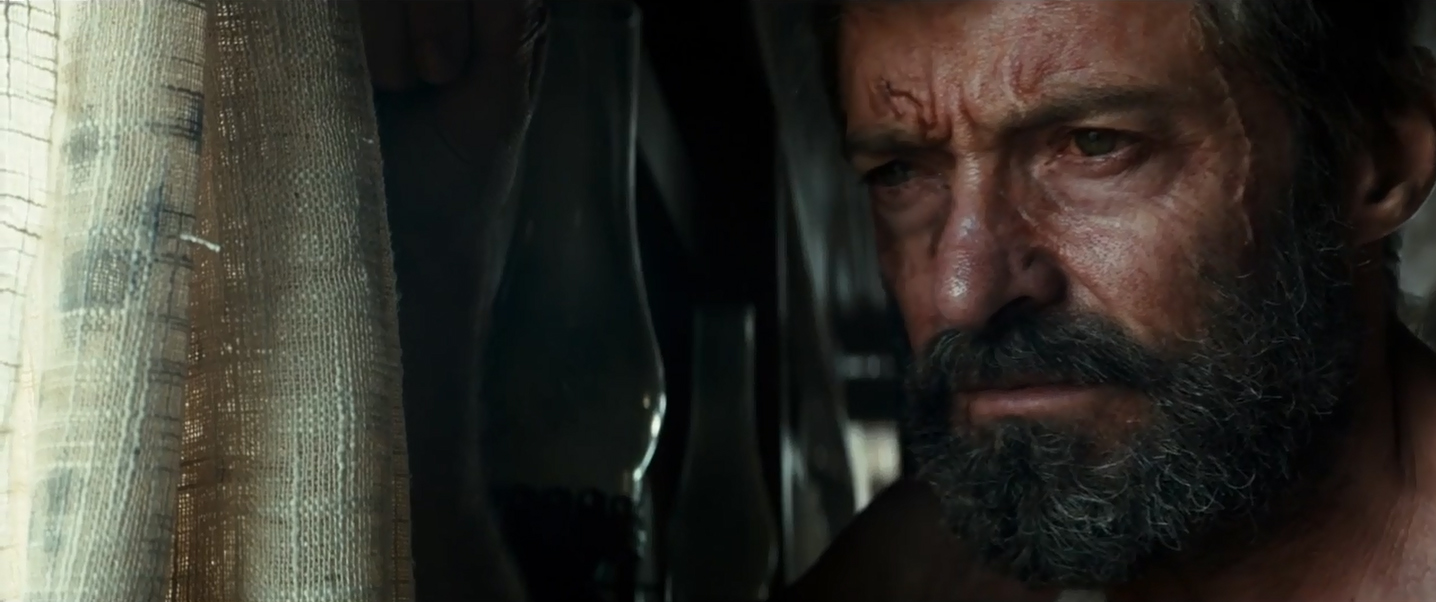
Logan, seen here having flashbacks of X-MEN ORIGINS: WOLVERINE
Wolverine, aside from being one of the most widely-known and easily-recognizable comic book characters, is also one of the most tragic. The man born James Howlett, later known as Logan and Wolverine, is something of a modern-day Sisyphus. A mutant gifted with greatly enhanced senses, strength, and reflexes, as well as an extremely efficient healing factor (not to mention his trademark retractable claws), here is a man who just cannot seem to die. His regenerative powers not only allow him to instantaneously recover from even the most grievous of wounds, but they greatly increases his lifespan as well. And while he can recover from just about anything, that doesn’t suggest he doesn’t feel pain; his heightened senses mean that he feels every impact, every blade, claw, and bullet that much more. Wolverine’s life is one of unending pain—one in which he will have to stand and fight, over and over again, long after everyone else around him has fallen—and now Logan, nearly 150 years old during the events of this film, is finally starting to show signs of wearing out.
Jackman was purportedly hungover when he had his first ideas for LOGAN, and while that may or may not be true, it is definitely believable (there are more than a few shades of LEAVING LAS VEGAS here, with Logan actively pursuing a death-spiral on the outskirts of the desert). The once mythologized hero, The Wolverine, is now a depressed, suicidal alcoholic moonlighting as a limo driver in the boonies of New Mexico. He is slower, his claws suffer from a dysfunction of sorts, and he no longer heals nearly as well as he used to. He is a broken-down and lost shadow of his former self, and what little effort he gives is in tending to an equally disgraced Charles Xavier. Xavier, aka Professor X, once the world’s most brilliant psychic, is also in decline. 90-something years old and suffering from Alzheimer’s, the most powerful mind on Earth is now a ticking time bomb. Awaiting a quiet death where they can’t hurt anyone, the two are thrust into a situation in which they soon rediscover a sense of purpose. Enter Laura, the first new mutant in 25 years—one who bears an uncanny resemblance to Logan.
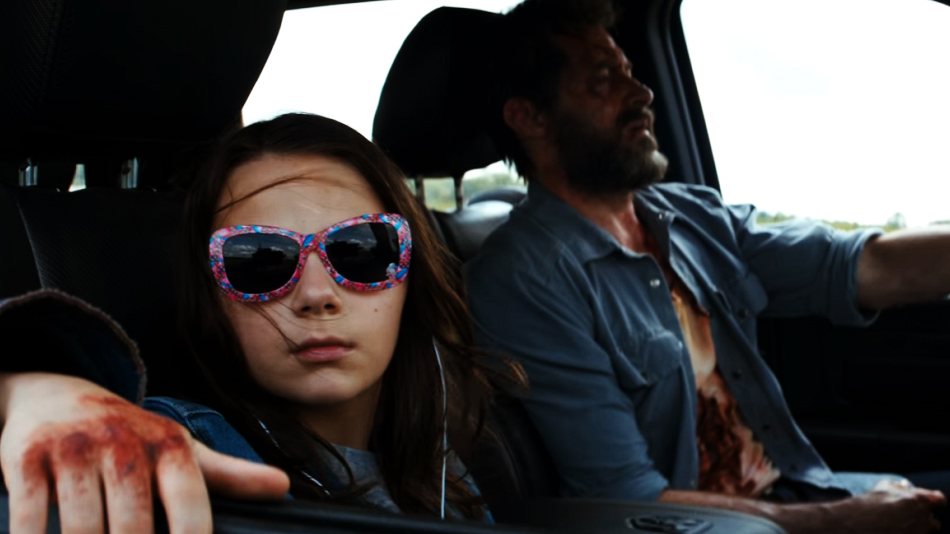
Not quite LITTLE MISS SUNSHINE
The thing to be remembered about Wolverine is that he isn’t a hero; he never has been, and a burnt-out drunk with a death wish is not a stretch by any means. His character was conceived near the end of the grim failure that was the Vietnam Conflict, a time when the Boy Scout/Cowboy heroics and optimism of existing books left a sour taste in the mouths of readers. The next generation of heroes had to be different, and so the comic antihero was born. Sullen, rage-fueled loners cursed by death dominated the ‘80s, Wolverine being the foremost of these. Logan never wanted to be a hero, or the caretaker of anyone, especially not as a father-figure. All he ever wanted was to be left alone. But that was never to be. LOGAN captures this perfectly, with Hugh Jackman in the role of a lifetime, carrying real, staggering weight in his final go as the reluctant Wolverine. If it wasn’t already carved in stone, this will be the film that forever establishes Hugh Jackman and The Wolverine as not only synonymous, but inextricable. They are one and the same.
Jackman, the classically-trained and lovable Aussie, needless to say, is fantastic, but he is far from being in a class alone here. Everyone delivers in LOGAN, saving the film from what could easily have been a one-man show and elevating it to laudable heights. In his reprisal of Xavier, Patrick Stewart gives another landmark performance, perhaps his best yet. Xavier’s confusion and frustration, his inability to cope with the reality of his failing mental faculties, is painful, and the fleeting moments of clarity where he remembers—and relives—his tremendous guilt over losing control of his powers and hurting others is heart-rending. Once strong, still proud, now ornery, difficult, and refusing care, his moments with begrudging caretaker Logan are agonizing. However, ever the optimist, Charles still manages to dig deep and reach out to others throughout the movie, injecting the generally downbeat film with heartwarming moments of levity and compassion.
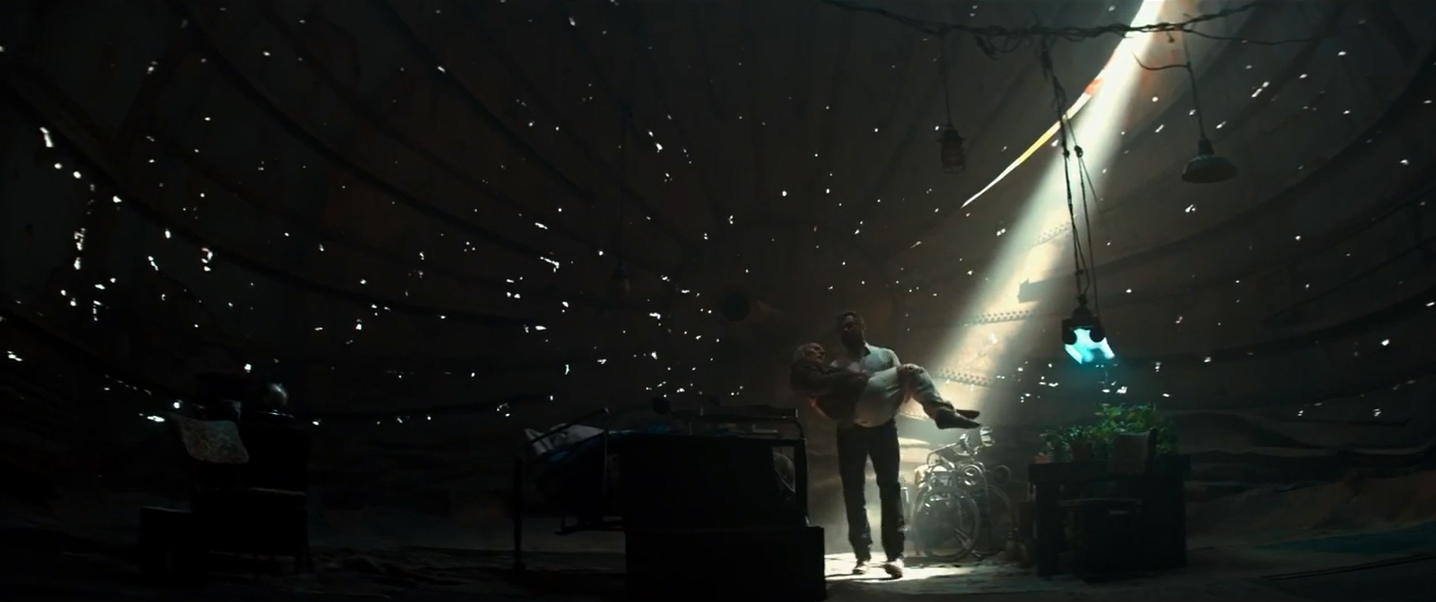
This is what happens when you cut healthcare
Boyd Holbrook of NARCOS fame is Pierce, leader of a PMC group known as The Reavers. Pierce is charged with hunting down “R&D gone bad,” X-23, a seemingly cut-and-dry job which he nevertheless carries out with extreme prejudice, torturing and killing everyone he crosses paths with along the way. Cocky, vicious, and cowardly in equal measure, Holbrook knocks it out of the park as one of the most thoroughly detestable characters I have seen since Guy Pearce’s Charlie Rakes in 2012’s LAWLESS. However, the real breakout star here is Dafne Keen, who plays the aforementioned Laura/X-23. Laura is a mirror of Logan in many ways. Standoffish with an undercurrent of smoldering rage (a rage which frequently explodes into full-blown bouts of shrieking violence), Laura resembles a pint-sized version of Logan as he first appeared in 2000’s X-MEN.
Indeed, one of the guilty pleasures of LOGAN is in seeing Laura fly into a berserker rage alongside Wolverine, outpacing (and out-slashing) the old Canuck in a dizzying flurry of claws, but this is to say nothing of her acting chops. Some have had less than favorable things to say of Keen’s performance as Laura, citing her staring, screaming, and general brattiness as irritating, but I don’t really know what else is to be expected of a child raised in a lab as a bioweapon. Jokes aside, Keen does incredibly well for an 11-year-old in her first motion picture role. Speaking lines is one thing, but conveying emotion entirely through facial expressions and body language (she is mute for the first half of the film) is another thing entirely. Her on-screen edginess and irritability is palpable, but it is the deep-seated fear and resultant hatred beneath the agitation that is truly powerful. Keen does a tremendous job at playing a disaffected, traumatized youth who had to grow up real hard, real fast. Bilingual, nuanced, surprisingly physical (though she does have a stunt double), and straight-up intimidating, she is simply an unbelievably impressive child. Expect to see a whole lot more of her in the years to come.
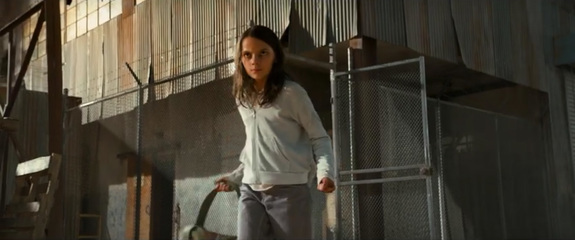
I was just kidding, you don’t have to do your homework. Please don’t kill me
However, as fresh as it feels, one would be remiss to discuss LOGAN without comparing it to at least a few of the films that have leant to it. Of course, the most obvious comparison to be made is to that of its predecessor, 2013’s THE WOLVERINE. Unlike some of the entries in the X-MEN canon, it was a rather small film that utilized a handful of lesser-known characters to tell a story with an actual sense of involvement. It wasn’t (too) farfetched, bloated, or overwrought, and it was focused enough to make one care about its characters and the things that were happening to them. LOGAN takes that same approach and strips it down even further. Once again, we follow a Logan at the end of his rope, as he is dragged through an emotional minefield of loss, remorse, honor, and redemption, except now we’ve traded Yakuza, ninja, and robot samurai for a much more realistic battle against mercenaries—and time itself.
Time destroys all things—even The Wolverine. LOGAN doesn’t embrace this theme, it chases it down to the bitter end. As the hourglass runs out, the hack-and-slash, dystopian-future superhero movie reveals itself as more of a film about legacy—the legacy of the mutant race, the X-Men, of Logan himself, but also of the Western genre. On the obvious level, the film takes place between the New Mexico/Mexico border and later across Oklahoma and the badlands of North Dakota, and several parallels to the classic SHANE run throughout (Logan, Xavier, and Laura even stop to watch it at one point), but there is much more at play here. All of the old tropes—retribution, lightning strikes of violence, a mysterious rider in black, hardened tough guy concealing a heart of gold, taking up the saddle one last time—make appearances, but LOGAN owes just as much to more modern visions. Jackman taps into some serious Eastwood pathos for this final ride—not as the Man with No Name, but as Munny in UNFORGIVEN: an aging outlaw, mistaken in believing he had escaped his previous life, once again pulled back into the fray—and there are unmistakable shades of NO COUNTRY FOR OLD MEN as a chase film not so much about unstoppable killing machines as it is about futility. That sense of impending doom, of impotent rage, is all too real, and boy does it sting.
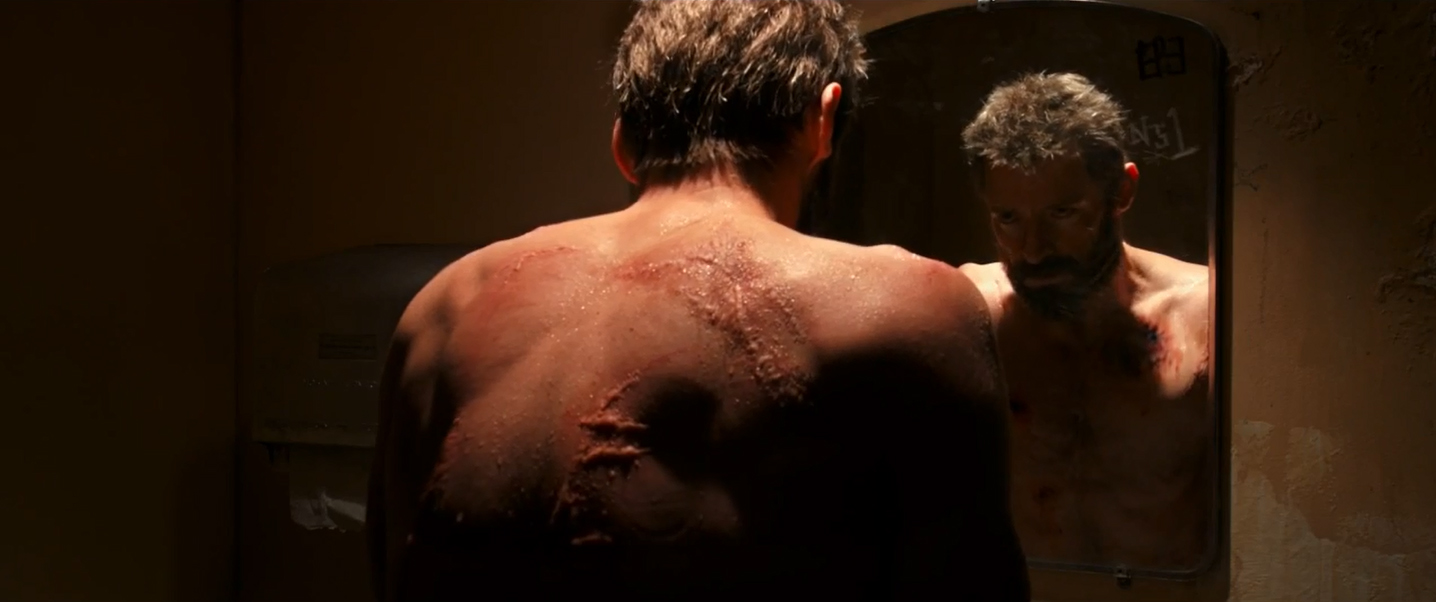
Might want to consider some lotion there, Bub
Historically, comic books—and by extension, comic book films—have gotten a bad rap. In spite of all of the iconic characters and the timeless stories they have gifted us with over the years, many still refuse to acknowledge the artistry, the importance, and, irrefutably, the cultural impact of the medium. It wasn’t until maybe a decade ago that the superhero movie, and especially the role of the superhero, was treated with any degree of seriousness. Superhero movies were (and still are) cranked out in a feverish bid to capitalize on growing market trends, with actors donning capes with little thought given to the legacy of the title. This has been rectified in recent years, as comics have become more mainstream, but even still, more often than not, the source material seems to be treated with little reverence—if not by actors, then by the studios and rights holders.
To give an example of this, two of the most well-known superheroes, Superman and Batman, have, respectively, seen 11 and eight live-action film and television portrayals since their first appearances nearly 80 years ago, with their most recent outing being almost universally reviled. Even the Marvel Universe, with all of the praise for its (only comparatively recent) consistency, has been no stranger to this. There have been four versions of Spider-Man (six if you count Japanese and Italian iterations), four Incredible Hulks, four Punishers, and three of each member of The Fantastic Four. However, there has only ever been one Wolverine. There has only been one, and there only ever will be one.
This all comes from a lifelong fanboy, so take it how you will, but I haven’t been this deeply affected by a movie in a long time, and never so much by a superhero movie. Jackman has stated that he couldn’t have made this movie if he wasn’t sure it was his last, and it shows. This is a very personal film, full of moving, from-the-heart performances, with a real gravitas and real emotional weight that leaves nothing in the tank. It is a work of blood, sweat, and tears—a work which finally, after nine films and 17 years, brings everything full circle. If Wolverine is the best there is at what he does, but what he does best isn’t very nice, then so is Jackman, but what he does is momentous. LOGAN goes out fighting, triumphant.
Verdict: Recommend


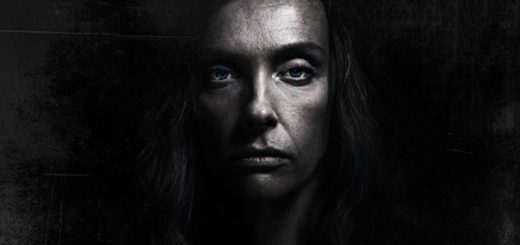
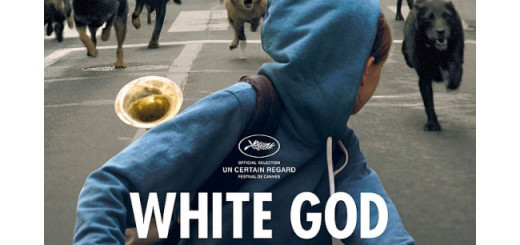
I enjoy a good beet salad.
awesome review jackseph ???